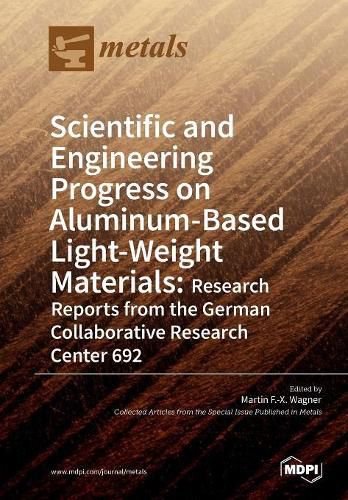Readings Newsletter
Become a Readings Member to make your shopping experience even easier.
Sign in or sign up for free!
You’re not far away from qualifying for FREE standard shipping within Australia
You’ve qualified for FREE standard shipping within Australia
The cart is loading…






This title is printed to order. This book may have been self-published. If so, we cannot guarantee the quality of the content. In the main most books will have gone through the editing process however some may not. We therefore suggest that you be aware of this before ordering this book. If in doubt check either the author or publisher’s details as we are unable to accept any returns unless they are faulty. Please contact us if you have any questions.
Aluminum-based light-weight materials offer great potential for novel engineering applications, particularly when they are optimized to exhibit high strength and yet provide sufficient reliability. The last decade has thus seen substantial activity in the research fields of high-strength aluminum alloys and aluminum-based composite materials.
For twelve years, backed by solid funding from the German Research Foundation (Deutsche Forschungsgemeinschaft, DFG), scientists of the Collaborative Research Center, High-strength aluminum-based light-weight materials for safety components (SFB 692) at TU Chemnitz, Germany, have contributed to this research area. Our research efforts have been focused on three main areas: ultrafine-grained aluminum alloys produced by severe plastic deformation; aluminum matrix composites; and aluminum-based composite materials (including material combinations such as magnesium/aluminum or steel/aluminum and the corresponding joining and forming technologies). The framework of SFB 692 has served as a base for numerous scientific collaborations between scientists in the fields of materials science, design engineering, production engineering, mechanics, and even economics–in Chemnitz, and with many well-established international experts around the world.
In this Special Issue, we present recent results on high-strength aluminum-based light-weight materials that also provide a broad overview of research activities in SFB 692 and elsewhere.
$9.00 standard shipping within Australia
FREE standard shipping within Australia for orders over $100.00
Express & International shipping calculated at checkout
This title is printed to order. This book may have been self-published. If so, we cannot guarantee the quality of the content. In the main most books will have gone through the editing process however some may not. We therefore suggest that you be aware of this before ordering this book. If in doubt check either the author or publisher’s details as we are unable to accept any returns unless they are faulty. Please contact us if you have any questions.
Aluminum-based light-weight materials offer great potential for novel engineering applications, particularly when they are optimized to exhibit high strength and yet provide sufficient reliability. The last decade has thus seen substantial activity in the research fields of high-strength aluminum alloys and aluminum-based composite materials.
For twelve years, backed by solid funding from the German Research Foundation (Deutsche Forschungsgemeinschaft, DFG), scientists of the Collaborative Research Center, High-strength aluminum-based light-weight materials for safety components (SFB 692) at TU Chemnitz, Germany, have contributed to this research area. Our research efforts have been focused on three main areas: ultrafine-grained aluminum alloys produced by severe plastic deformation; aluminum matrix composites; and aluminum-based composite materials (including material combinations such as magnesium/aluminum or steel/aluminum and the corresponding joining and forming technologies). The framework of SFB 692 has served as a base for numerous scientific collaborations between scientists in the fields of materials science, design engineering, production engineering, mechanics, and even economics–in Chemnitz, and with many well-established international experts around the world.
In this Special Issue, we present recent results on high-strength aluminum-based light-weight materials that also provide a broad overview of research activities in SFB 692 and elsewhere.